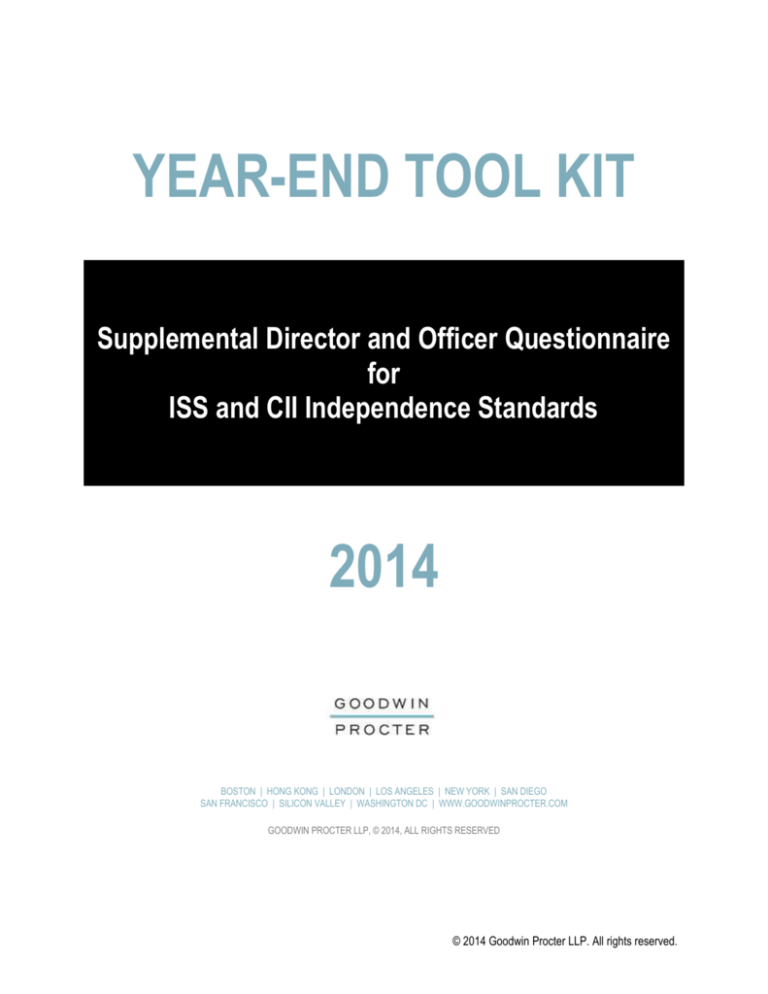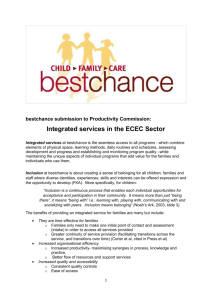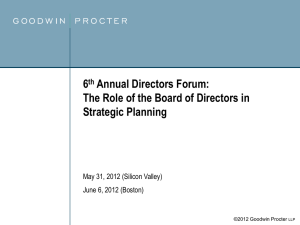
YEAR-END TOOL KIT
Supplemental Director and Officer Questionnaire
for
ISS and CII Independence Standards
2014
BOSTON | HONG KONG | LONDON | LOS ANGELES | NEW YORK | SAN DIEGO
SAN FRANCISCO | SILICON VALLEY | WASHINGTON DC | WWW.GOODWINPROCTER.COM
GOODWIN PROCTER LLP, © 2014, ALL RIGHTS RESERVED
© 2014 Goodwin Procter LLP. All rights reserved.
PREPARER NOTES:
This document is provided with the understanding that it does not constitute the rendering of legal or other
professional advice by Goodwin Procter LLP or its attorneys. This document (which is in Microsoft Word® format)
may be saved and edited so that it can be modified for a specific company (for example, name of the company, name
of the contact person, etc.). This document may also require other revisions to render it suitable for a specific
company’s circumstances. In the event this document is substantively modified (for example, to shorten or simplify
it), the preparer should verify that the questionnaire, as modified, will still gather the information necessary in
connection with the legal matters covered by this questionnaire.
Please note that this questionnaire addresses only independence standards of Institutional Shareholder Services Inc.
and the Council of Institutional Investors and is intended to supplement other questionnaires to be used in connection
with the preparation of year-end documents by public companies. Additional separate questionnaires addressing the
following matters are available in our Year-End Tool Kit to supplement this questionnaire:
(1)
(2)
(3)
(4)
(5)
(6)
information required with respect to directors, officers and control persons;
director and committee member independence requirements under SEC and stock exchange rules;
Iran Threat Reduction and Syria Human Rights Act matters;
Foreign Corrupt Practices Act matters;
annual Form 5 reporting and disclosure under Section 16; and
Rule 506(d) and Rule 506(e) “bad actor” events.
This document has been prepared for use by domestic public companies with common stock listed on a U.S. stock
exchange, and is not appropriate for companies subject to different SEC or stock exchange requirements, including
but not limited to asset backed issuers, foreign private issuers or investment companies, nor does it reflect SEC rules
applicable to smaller reporting companies or emerging growth companies. This questionnaire is intended to be used
in connection with preparation of the company’s Annual Report on Form 10-K and proxy statement and should not be
used in connection with preparation of registration statements without further review and revision. This document is
not a substitute for advice of qualified attorneys. We recommend that you consult with your regular Goodwin Procter
LLP attorney prior to using this document.
© 2014 Goodwin Procter LLP. All rights reserved.
NAME:
[EDIT – Insert Company Name]
Supplemental Questionnaire for Directors, Officers
and Controlling Persons
in connection with
2013-2015 ISS and CII Objective Director Independence Standards
The following questions address the objective standards for assessing director independence adopted by Institutional
Shareholder Services Inc., a proxy voting and corporate governance advisory firm not affiliated with the SEC or any
stock exchange (“ISS”), and the Council of Institutional Investors, a non-profit association of public, labor and
corporate pension funds not affiliated with the SEC or any stock exchange (“CII”). These questions are separate
from those contained in the Questionnaire for Directors, Officers and Controlling Persons and the Questionnaire for
Non-Employee Members of the Board of Directors for Director Independence, Audit Committee and Compensation
Committee Matters, which are based on mandatory disclosure and corporate governance requirements under SEC
and stock exchange rules. Because the questions in this supplemental questionnaire closely follow the respective
standards of ISS and CII, some of the questions in the two sections below may overlap or duplicate questions in the
other section or in other Company questionnaires. To facilitate review of the extent to which the Board of Directors
and the audit, compensation and nominating committees satisfy the respective standards of ISS and/or CII and
identify clearly where potential questions may exist, the Company requests that you answer each question in this
questionnaire.
Note concerning defined terms: In addition to some terms previously defined in other questionnaires circulated by
the Company, each of the two sections below uses terms that are defined by ISS or CII, respectively. For your
convenience, defined terms are indicated in bold underscored text. Where the definitions differ from those used in
another Company questionnaire, these definitions are provided in the footnotes below. Please review these
definitions as you complete the relevant questions and note that in some cases these definitions are different than
those used in SEC or stock exchange rules.
I.
ISS OBJECTIVE INDEPENDENCE STANDARDS1
A. Officer and/or Employee Relationships
1. Are you a current employee or officer2 the Company or one of its affiliates?3
☐ Yes ☐ No
1 Based on ISS U.S. Corporate Governance Policy, 2015 Updates (December 22, 2014, effective for meetings held on
or after February 1, 2015). ISS recommends that a majority of directors on a public company’s board, and that all members of
the Company’s nominating, compensation and audit committees, satisfy its independence standards.
2 As used by ISS for purposes of these questions, “officer” generally follows the definition of Section 16 officer (officers
subject to Section 16 of the Exchange Act) and includes the chief executive, operating, financial, legal, technology and
accounting officers of a company (including the president, treasurer, secretary, controller or any vice president in charge of a
principal business unit, division or policy function). Current interim officers are included in this definition.
3 For purposes of these questions, ISS defines “affiliate” to include a subsidiary or a sibling or parent company. ISS
uses 50% control ownership by the parent company as the standard for applying its affiliate designation.
© 2014 Goodwin Procter LLP. All rights reserved.
2. Are you one of the three most highly paid individuals of the Company, other than an individual serving or
who served as chief executive officer or chief financial officer? For purposes of this question, do not include
payments for service as an interim officer of the Company.
☐ Yes ☐ No
3. Are you currently or have you been an interim officer of the Company?
☐ Yes ☐ No
If yes, how long did you serve as an interim officer of the Company?
☐ 0-12 months ☐ 12-18 months4 ☐ Over 18 months
4. Do you currently serve, or have you previously served, as the Company’s chief executive officer, including
at any time prior to the Company’s initial public offering?
☐ Yes ☐ No
5. Do you currently serve, or have you served during the preceding five years, as:
the chief executive officer of any business or entity acquired by the Company?
☐ Yes ☐ No
an officer of the Company, an affiliate of the Company or any business or entity acquired by the
Company?
☐ Yes ☐ No
an officer of a former parent or predecessor firm at the time the Company was sold or split off from
such parent or predecessor?
☐ Yes ☐ No
6. Do you currently serve, or have you served as, the chief executive officer of a special purpose acquisition
corporation (a “SPAC”) that has acquired an investment interest in the Company?
☐ Yes ☐ No
If the service was for 12-18 months, ISS states that it will make an assessment of the interim officer’s employment
agreement to determine if it contains severance pay, long-term health and pension benefits or other such standard provisions
typically contained in contracts of permanent, non-temporary chief executive officers. ISS will also consider if a formal search
process was underway for a full-time officer at the time.
4
2
© 2014 Goodwin Procter LLP. All rights reserved.
If the answer to the immediately preceding question is yes, please describe in the space below (1) any
operating ties between the SPAC and the Company and (2) any past, present or potential future
relationships (whether or not involving a potential conflict of interest) and/or related party transactions that
involve the SPAC and the Company and any of their respective affiliates.5
7. Are you now, or have you been, an officer, a general partner and/or a limited partner of a joint venture or
partnership with the Company?
☐ Yes ☐ No
8. Are you an immediate family member6 of a current officer of the Company or one of its affiliates?
☐ Yes ☐ No
9. Are you an immediate family member of a current employee of the Company or one of its affiliates?
☐ Yes ☐ No
If yes, please answer the following questions:
How many of your immediate family members are Company employees?
_____________
Are you are related to a non-Section 16 officer employed by the Company or one of its affiliates in
a key strategic role?
☐ Yes ☐ No
10. Are you an immediate family member of someone who served as an officer of the Company or one of its
affiliates during the preceding five years?
☐ Yes ☐ No
11. Are you a founder7 of the Company, whether or not you are currently employed by the Company?
☐ Yes ☐ No
5 ISS has indicated that it will generally take into account the following factors: the applicable listing standards
determination of the director’s independence; any operating ties to the Company; and the existence of any other conflicting
relationships or related party transactions.
6 As used by ISS, “immediate family member” includes spouses, parents, stepparents, children, stepchildren,
siblings, mothers and fathers in law, sons and daughters in law, and brothers and sisters in law and any person sharing the
household (other than a tenant or employee) of any director, nominee for director, executive officer or significant shareholder of
the company.
7 ISS states that it will consider the operating involvement of the founder with the company. Little to no operating
involvement ever may cause ISS to deem the founder as an independent outside director.
3
© 2014 Goodwin Procter LLP. All rights reserved.
B. Shareholder and/or Affiliate Status
1. Do you directly or indirectly beneficially own more than 50% of any class of the Company’s voting
securities?
☐ Yes ☐ No
If yes, please state the number of voting securities and the percentage of each class of the Company’s
voting securities of which you are the beneficial owner:
Class
Number of Shares
Percentage of Class
2. Are you a member of a group8 formed with respect to the ownership or voting of any voting securities of the
Company?
☐ Yes ☐ No
If yes, please describe briefly the nature and purpose of the group and identify its members:
3. Does the group, or do any members of the group, referred to in the answer to the preceding question
beneficially own, directly or indirectly, individually or in the aggregate, more than 50% of any class of the
Company’s voting securities?
☐ Yes ☐ No
If yes, please state the number of voting securities and the percentage of each class of the Company’s
voting securities of which each member of such group is the beneficial owner.
Name
Class
Number of Shares
Percentage of Class
8 A group may exist when two or more persons act as a general partnership, limited partnership, syndicate or other
group for the purpose of acquiring, holding or disposing of securities of the Company.
4
© 2014 Goodwin Procter LLP. All rights reserved.
C. Board Interlocks
1. Do you or any of your immediate family members have an interlocking9 relationship involving any
members of the Board of Directors of the Company or any members of the Compensation Committee (or
other committee performing a similar function) of the Company?
☐ Yes ☐ No
D. Transactional and Business Relationships
1. Do you or any of your immediate family members, or any organization or entity in which you or any of your
immediate family members is a partner, a controlling shareholder or an employee, currently provide
professional services, as defined below, in excess of $10,000 per year to:
the Company?
☐ Yes ☐ No
an affiliate of the Company?
☐ Yes ☐ No
an officer of the Company?
☐ Yes ☐ No
an officer of one of the affiliates of the Company?
☐ Yes ☐ No
For purposes of these questions, “professional services” means services that are advisory in nature,
generally involving access to sensitive company information or to strategic decision-making, and typically
have a commission- or fee-based payment structure. The following types of services are specifically
included as “professional services” for purposes of this question: investment banking/financial advisory
services; commercial banking (other than deposit services)10; investment services; insurance services;
accounting/audit services; consulting services; marketing services; legal services; property management
services; realtor services; lobbying services; executive search services; and IT consulting services (other
than tech support).11
For purposes of these questions, ISS defines “interlocks” to include (a) executive officers’ service as directors on
each other’s compensation or similar committees (or, in the absence of such committee, on the Board of Directors) or (b)
executive officers sitting on each other’s boards and at least one serving on the other’s compensation or similar committees (or,
in the absence of such a committee, on the Board of Directors).
9
Under its current policies, ISS will not consider participation in a banking syndicate by a non-lead bank as a
professional relationship.
10
11 Under its current policies, ISS will consider insurance services and marketing services to be “professional services”
unless the company explains why such services are not advisory. Information technology services will be considered
“professional services” unless such services are limited to tech support. Educational services and construction services are
generally not considered professional services. “Of counsel” relationships are only considered immaterial if the individual does
5
© 2014 Goodwin Procter LLP. All rights reserved.
2. Do you or any of your immediate family members, or any organization or entity in which you or any of your
immediate family members is a partner, a controlling shareholder or an executive officer, have a
transactional relationship (including, without limitation, any grants to non-profit organizations) with the
Company or any one of its affiliates (excluding investments in the Company through a private placement of
the Company’s securities)?
☐ Yes ☐ No
If yes, please answer either (A) or (B) below, as applicable:
(A) for directors of NYSE-listed and NYSE MKT (formerly NYSE Amex)-listed companies only:
Does the aggregate amount involved exceed the greater of (a) $1,000,000 or (b) 2% of the
recipient’s gross revenues?
☐ Yes ☐ No
(B) for directors of all other public companies:
Does the aggregate amount involved exceed the greater of (a) $200,000 or (b) 5% of the
recipient’s gross revenues?
☐ Yes ☐ No
3. Are you a party to any voting agreement, arrangement or contract to vote with or as recommended by
management of the Company on proposals that require the vote of the shareholders of the Company?
☐ Yes ☐ No
If you are a party to a settlement, voting or other agreement relating to the settlement of a proxy contest that
contains provisions relating to the voting of shares of the Company’s equity securities, or if you are the
designee of an investor group that is a party to such an agreement, please describe in the space below (a)
the terms of the agreement; (b) the duration of any “standstill” provision in the agreement; (c) any limitations
and requirements of actions that are agreed upon; (d) whether you or any other director nominee(s) under
the voting or settlement agreement are subject to a “standstill”; and (e) whether there are any past, present
or potential future relationships or related party transactions between the Company and you or any investor
entity or group and any of their respective affiliates.
not receive any form of compensation (in excess of $10,000 per year) from, or is a retired partner of, the firm providing the
professional service.
6
© 2014 Goodwin Procter LLP. All rights reserved.
4. Are you or any of your immediate family members a trustee, director or employee of a charitable or nonprofit organization that receives grants or endowments from the Company or any one of its affiliates?
☐ Yes ☐ No
If yes, please answer either (A) or (B) below, as applicable:
(A) for directors of NYSE-listed and NYSE MKT-listed companies only:
Does the aggregate amount involved exceed the greater of (a) $1,000,000 or (b) 2% of the
recipient’s gross revenues?
☐ Yes ☐ No
(B) for directors of all other public companies:
Does the aggregate amount involved exceed the greater of (a) $200,000 or (b) 5% of the
recipient’s gross revenues?
☐ Yes ☐ No
5. Other than as identified above, do you have any transactional relationship, financial connection or other
related party relationship to the Company? Please include any relationship or connection (business,
financial, personal or otherwise) that a reasonable person might conclude could potentially influence a
director’s objectivity in the boardroom in a manner that would have a meaningful impact on the director’s
ability to satisfy his or her fiduciary duties on behalf of shareholders.
☐ Yes ☐ No
7
© 2014 Goodwin Procter LLP. All rights reserved.
II. CII OBJECTIVE INDEPENDENCE12 STANDARDS13
A. Officer and/or Employee Relationships
1. Are you now, or have you been within the preceding five years, employed in any capacity by the Company
or one of its affiliates14?
☐ Yes ☐ No
2. Are you now, or have you been within the preceding five years, a director of an affiliate of the Company?
☐ Yes ☐ No
3. Are any of your relatives15 now, or have any of your relatives been within the preceding five years,
employed in any capacity by the Company or one of its affiliates?
☐ Yes ☐ No
4. Are any of your relatives now, or have any of your relatives been within the preceding five years, a director
of an affiliate of the Company?
☐ Yes ☐ No
B. Board Interlocks
1. Are you or any of your relatives, or during the preceding five years have you or any of your relatives been,
a part of an interlocking directorate in which the chief executive officer or other employee of the Company
serves on the Board of Directors of a third party entity (regardless of whether or not for profit) that employs
you or your relative?
☐ Yes ☐ No
12
The Council of Institutional Investors defines an independent director as follows:
[A]n independent director is someone whose only non-trivial professional, familial or financial connection to
the corporation, its chairman, CEO or any other executive officer is his or her directorship. Stated most
simply, an independent director is a person whose directorship constitutes his or her only connection to the
corporation.
Based on CII’s Corporate Governance Policies updated as of October 1 2014. CII recommends that at least twothirds of the directors on a public company’s board, and that all members of the company’s nominating, compensation and audit
committees, satisfy CII independence standards.
13
CII considers an “affiliate” relationship to be established if one entity (either alone or pursuant to an arrangement
with one or more other persons) owns or has the power to vote more than 20% of the equity interest in another, unless some
other person (either alone or pursuant to an arrangement with one or more persons) owns or has the power to vote a greater
percentage of the equity interest. Joint venture partners and general partners meet CII’s definition of an affiliate, and officers and
employees of joint venture enterprises and general partners are considered affiliated. A subsidiary is an affiliate if it is at least
20% owned by the company. Affiliates also include predecessor companies. CII defines a “predecessor” as an entity that
within the last five years was party to a “merger of equals” with the company or represented more than 50% of the company’s
sales or assets when such predecessor become part of the company.
14
15 For purposes of the questions in this Section II, the term “relatives” includes spouses, parents, children,
stepchildren, siblings, mothers and fathers-in-law, sons and daughters-in-law, brothers and sisters-in-law, aunts, uncles, nieces,
nephews and first cousins, and anyone sharing the director’s home.
8
© 2014 Goodwin Procter LLP. All rights reserved.
C. Disqualifying Transactions and Business Relationships
1. Are you or any of your relatives, or during the preceding five years have you or any of your relatives been,
an employee, director or greater than 20% owner of a firm that:
is a paid advisor or consultant16 for the Company or one of its affiliates?
☐ Yes ☐ No
receives revenues of $50,000 or more for serving as a paid advisor or consultant to an executive
officer17 of the Company?
☐ Yes ☐ No
2. Are you or any of your relatives, or during the preceding five years have you or any of your relatives been,
employed by, or owners of a 5% or greater ownership18 interest in, a third party that provides payments to,
or receives payment from, the Company and either:
such payments account for 1% of either party’s consolidated gross revenues in any single fiscal
year?
☐ Yes ☐ No
the third party is a debtor or creditor of the Company and the amount owed exceeds 1% of either
party’s assets?
☐ Yes ☐ No
3. Do you or any of your relatives have, or have you or any or your relatives had during the preceding five
years, a personal contract19 (including indebtedness or any similar arrangement) involving the Company, an
executive officer or any affiliate of the Company for which the amount paid or received during the five-year
period exceeds $50,000? Please note that additional follow-up may be required if you answer yes to this
question.
☐ Yes ☐ No
16 For purposes of these questions, advisors or consultants include, but are not limited to, law firms, auditors,
accountants, insurance companies and commercial and investment banks. Individuals serving “of counsel” to a firm are
considered employees of that firm.
17 For purposes of the questions in this Section II, CII defines “executive officer” to include the chief executive,
operating, financial, legal and accounting officers of a company. This includes the president, treasurer, secretary, controller and
any vice-president who is in charge of a principal business unit, division or function (such as sales, administration or finance) or
performs a major policy-making function for the company.
18 For purposes of the questions in this Section II, the CII standards provide that “ownership” refers to beneficial or
record ownership, not custodial ownership.
CII states that it believes that even small personal contracts, no matter how formulated, can threaten a director’s
complete independence. This includes any arrangement under which the director borrows or lends money to the company at
rates better (for the director) than those available to normal customers – even if no other services from the director are specified
in connection with this relationship.
19
9
© 2014 Goodwin Procter LLP. All rights reserved.
If yes, please state whether the contract involved you or one of your relatives and the total amount paid or
received during this five year period:
4. Are you or any of your relatives now, or have you or any of your relatives during the preceding five years
been:
an employee or director of a foundation, university or other non-profit organization that receives
significant grants or endowments20 from the Company, an affiliate of the Company or any
executive officer of the Company?
☐ Yes ☐ No
a direct beneficiary of any donations to a foundation, university or other non-profit organization that
receives significant grants or endowments from the Company, an affiliate of the Company or any
executive officer of the Company?
☐ Yes ☐ No
5. Are any of your relatives now, or during the preceding five years have any of your relatives been, an
employee, director or a 5% or more owner of a third party entity that is a significant competitor of the
Company?
☐ Yes ☐ No
6. Are you a party to a voting trust, agreement or proxy giving your decision-making power as a director to
management (other than any fully-disclosed and narrow voting agreement such as those which are
customary between venture capitalists and management regarding the venture capitalists’ board seats)?
☐ Yes ☐ No
In addition, note that CII policies require the Board of Directors to consider all relevant facts and circumstances
to determine whether a director should be considered independent, including the director’s years of service on
the Board of Directors, since “[e]xtended periods of service may adversely impact a director’s ability to bring an
objective perspective to the boardroom.”
Please sign and date this Questionnaire on the next page.
20 For purposes of these questions, a “significant grant or endowment” is a grant or endowment that exceeds the lesser
of $100,000 or 1% of the total annual donations received by the organization.
10
© 2014 Goodwin Procter LLP. All rights reserved.
I have attached ______ additional pages to this Questionnaire.
The information set forth in this questionnaire is true and correct to the best of my knowledge. I will notify
the Company immediately if any of this information becomes inaccurate, incomplete or otherwise changes as the
result of any developments, including the passage of time and any new relationships that may develop.
Dated:
Signature
Name: Please print or type
11
© 2014 Goodwin Procter LLP. All rights reserved.









